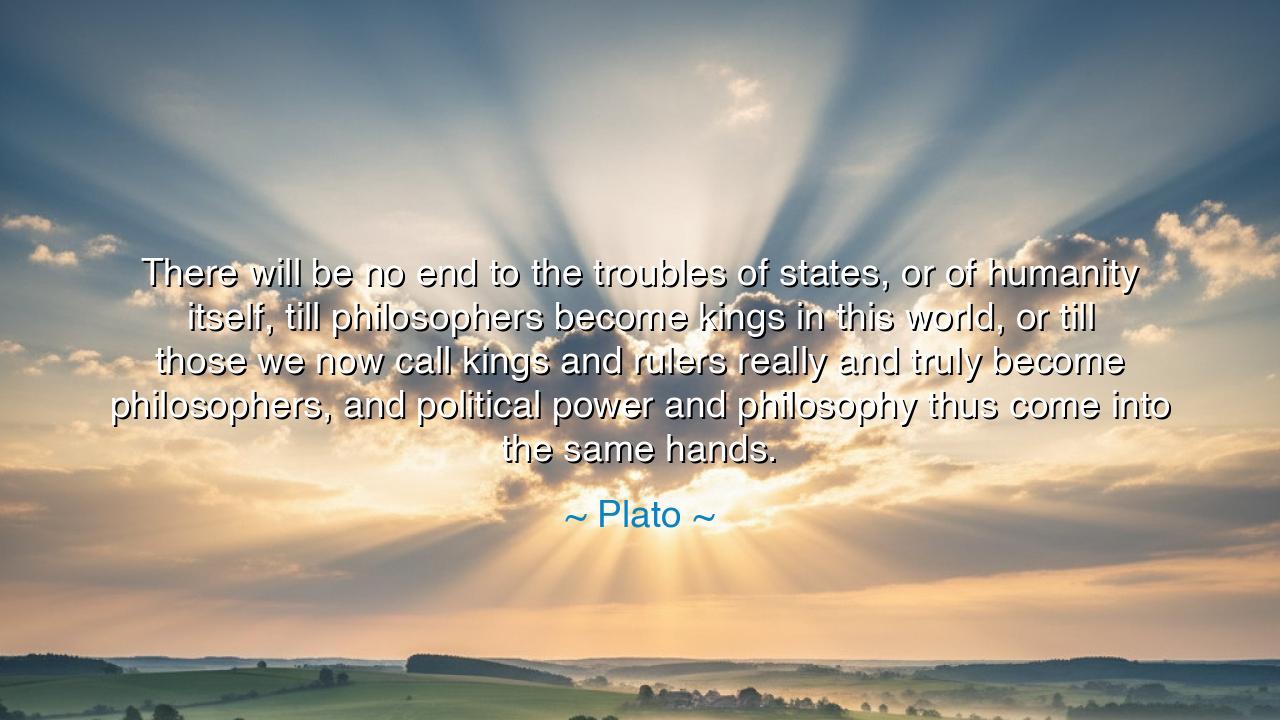
There will be no end to the troubles of states, or of humanity
There will be no end to the troubles of states, or of humanity itself, till philosophers become kings in this world, or till those we now call kings and rulers really and truly become philosophers, and political power and philosophy thus come into the same hands.






In the golden age of ancient Greece, the sage Plato beheld the turmoil of his city and the corruption of its rulers. From the ashes of failed democracies and tyrannies, he spoke a truth that has echoed through the ages: “There will be no end to the troubles of states, or of humanity itself, till philosophers become kings, or till those we now call kings and rulers really and truly become philosophers.” These words are not merely political counsel—they are a vision of harmony between wisdom and power, a union that could guide humanity away from chaos and destruction.
A philosopher seeks truth above all else. He is not swayed by greed, flattery, or the clamor of the crowd. His heart is fixed on justice, his mind sharpened by reflection, and his soul aligned with the eternal order of the universe. By contrast, the common ruler often seeks only wealth, glory, and dominion. Without wisdom, power becomes a weapon of tyranny. Without justice, laws become chains. Thus, Plato saw that the endless troubles of states—war, corruption, and rebellion—stem from this fatal divide between knowledge and authority.
History has revealed both the glory and tragedy of this truth. Consider Marcus Aurelius, the Roman emperor who was also a Stoic philosopher. In an age of decadence and turmoil, he ruled with humility and introspection, recording his thoughts in the Meditations. Though beset by wars and betrayals, Marcus governed not for his own glory but for the good of his people, embodying Plato’s ideal of a ruler who was truly a philosopher. Under his reign, Rome experienced a rare balance of strength and justice, proving that such harmony, though difficult, is not impossible.
Yet far more often, rulers without wisdom have brought ruin. When Napoleon Bonaparte, a brilliant tactician but not a philosopher, crowned himself emperor, he sought to bend Europe to his will. His conquests, though dazzling, were driven by ambition rather than understanding of the deeper harmony of nations. In the end, his empire crumbled, leaving behind rivers of blood. His story reminds us that power unguided by philosophy inevitably leads to destruction.
Let this be a teaching for all generations: the salvation of nations lies not in might alone, nor in idealism without strength, but in the union of philosophy and power. Until rulers seek truth as fervently as they seek victory, the world will be plagued by suffering. Therefore, raise leaders who are thinkers, and thinkers who are willing to lead. For only when wisdom and authority dwell in the same heart will humanity rise above its endless cycle of chaos and at last build a realm of justice and peace.






TMtra mi
This quote makes me think about historical examples where leaders were either profoundly wise or dangerously unreflective. Could combining philosophical understanding with political authority prevent wars, corruption, and societal strife? At the same time, I question how such a system would be implemented fairly. How can societies ensure that those in power genuinely embody philosophical virtues rather than using philosophical rhetoric to justify personal ambitions?
VTNguyen Van Thai
Reading this, I consider whether Plato’s vision reflects a tension between intellectual insight and practical power. If rulers were philosophers, would empathy, justice, and long-term thinking guide policy more effectively than short-term ambition? I also wonder about the implications for civic education—should ordinary citizens be encouraged to think philosophically to hold leaders accountable, or is this ideal unattainable given human nature and political complexity?
THTrung Tran Hieu
I find this perspective both inspiring and daunting. Could the fusion of philosophy and political authority truly resolve the persistent troubles of states? At the same time, it raises questions about practicality—are philosophers suited to wielding power, or would political realities corrupt them? How can societies cultivate leaders who possess both deep wisdom and effective governing skills without idealizing either quality excessively?
DHDau Haitani
This quote makes me reflect on the ideal qualities of leadership. Should rulers be not just politically skilled, but deeply wise and morally grounded? I wonder whether modern governments could benefit if leaders had philosophical training or a broader understanding of ethics and human nature. Is Plato suggesting that knowledge and reflection are more essential to governance than power or charisma alone, and how feasible is this in today’s world?